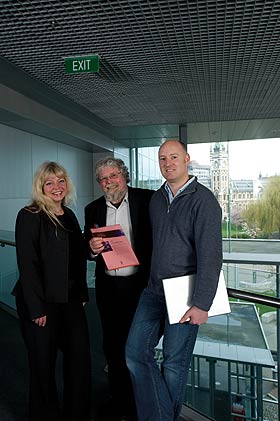

Dr Alex Tickle, Professor Warren Tate and Dr Tony Cardno
Their collaboration has the potential to develop a drug to control the Human Immunodeficiency Virus (HIV).
Academic research needs funding and funding providers need results that can be developed to generate commercial products and to benefit society.
The academic and commercial worlds need each other, but where research is not sufficiently advanced to justify the risk of investment, there is often a gap. Dr Alex Tickle, commercialisation manager within the University's Otago Innovation Ltd, aims to bridge that gap.
“Great research is the essential foundation to succeed with our new products,” she says. “But the University also understands it has an obligation to develop technology to benefit the community. If there is a potentially useful product then we must develop it.”
Otago Innovation works with researchers, companies and investors to make connections, realise opportunities and guide development in areas where specialist skills are needed.
One of the latest collaborations – the High Throughput Screening Project – has the potential to develop a drug to control the Human Immunodeficiency Virus (HIV).
The project has its origins in work by Professor Warren Tate and Dr Tony Cardno, both of the Department of Biochemistry. Tate has recently been awarded New Zealand's premier science and technology honour, the Rutherford Medal, by the Royal Society of New Zealand. Initially, he discovered within a bacterial gene a new genetic mechanism called a frameshift, which was later found to be used by viruses to regulate the ratio of enzymes and structural proteins required for multiplication.
When Tate learned that HIV used this mechanism, he saw the possibility of developing a compound to interfere with the frameshift to prevent the virus multiplying and spreading.
For that strategy to work, a compound had to be found that would work without harming the expression of any human gene. Fortunately, Tate and Cardno had invented and developed a drug-discovery screening tool, which had subsequently been patented by Otago Innovation.
This cell-based test, or assay, could explore the effects of compounds on the frameshift mechanism and, hopefully, validate Tate's theory. But the researchers needed resources to progress further, not having a high throughput screening platform, screening skills or access to specialised compound libraries and HIV-infected human cells.
Tickle scouted for potential partners who could provide funding and/or expertise to support Tate and Cardno's research. She found that pharmaceutical companies were reluctant to invest so early in the development without biological validation.
Networking sourced some Australian possibilities and a chance meeting in the US led Tickle to the Melbourne-based Walter and Eliza Hall Institute of Medical Research (WEHI).
“Otago had developed the drug target and the screening tool, and WEHI had the equipment and personnel to use it, so now we can identify drug candidates and jointly seek access to human HIV-infected cells for biological validation,” says Tickle.
“The collaboration with WEHI is really good for Otago's reputation and WEHI is delighted about us. It's a match made in heaven. “Furthermore, Otago Innovation is set up to provide the management skills needed to steer the project in the most effective direction, developing partnerships and forward planning.”
Ongoing financial support is still a problem, but the international collaboration has attracted funding from the International Investment Opportunities Fund of the Health Research Council.
“Joining with WEHI has given us a pathway to translate science to something to benefit the community, which is one of the aims of the Health Research Council,” says Tickle.
Cardno is now in Melbourne overseeing setting up the testing on the WEHI high throughput screening platform. If the pilot scales up successfully in practice, further development may be picked up by pharmaceutical companies and, after clinical trials, there may be an effective new weapon to fight HIV.
“More and more researchers understand how their valuable work can benefit society by contributing to translational science to create commercial products,” says Tickle.
“This is just the beginning of a long journey to make sure that the next people in line have a chance to justify their investment. It's very early days but the potential is huge.”
Funding
- Health Research Council (HRC) International Investment
- Opportunities Fund
- HRC Project Grants
- Marsden Fund
- Foundation for Research, Science and Technology
- (FRST) PreSeed Accelerator Fund
- FRST TIF Expert Fund for Stanford Summer Institute
- for Entrepreneurship
- Otago Community Trust
- University of Otago Research Grants
- Otago Innovation Ltd
Lead up work: Howard Hughes International Research Scholar Award
to Warren Tate, Japanese Ministry of Health International Collaboration.